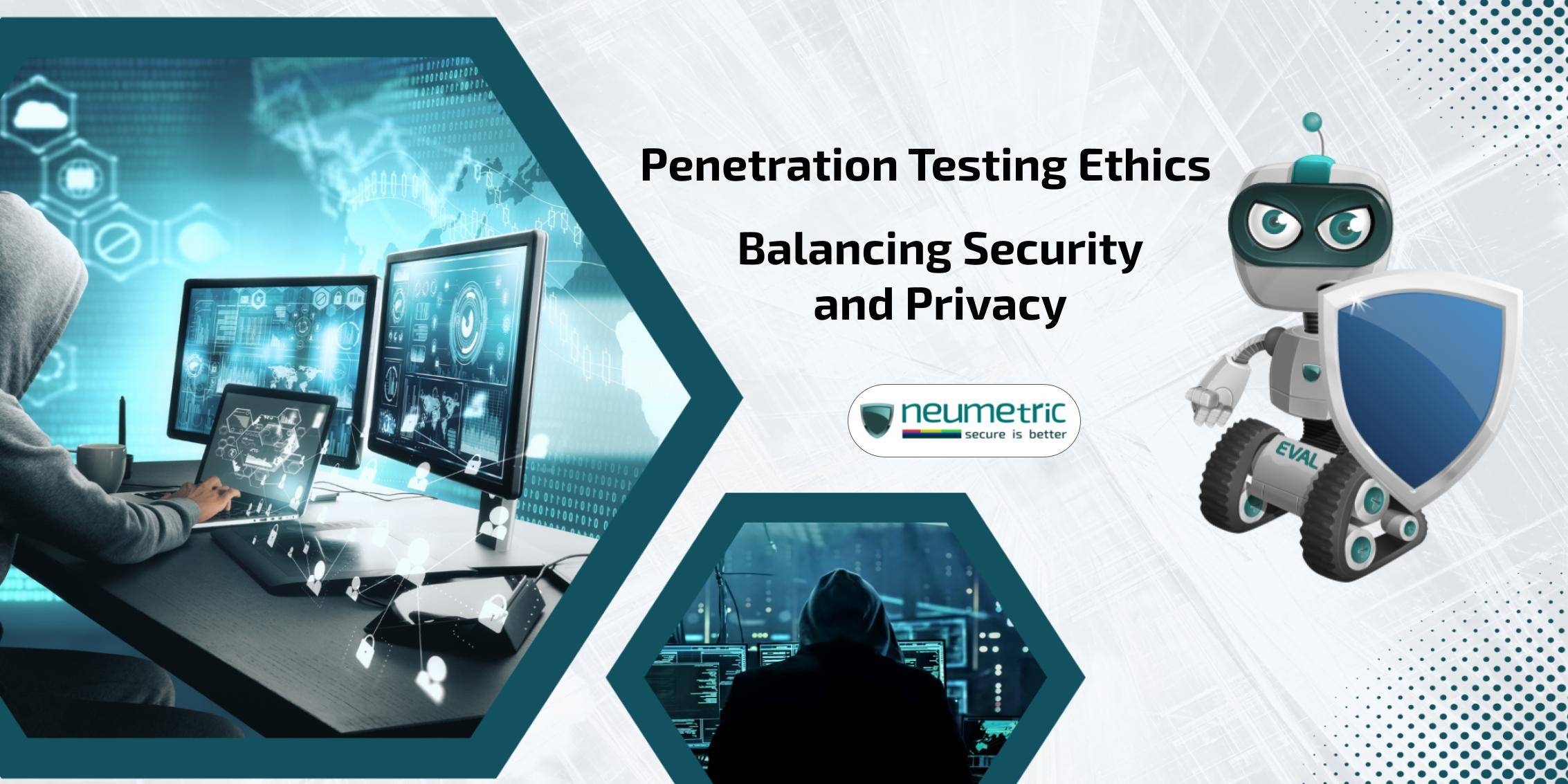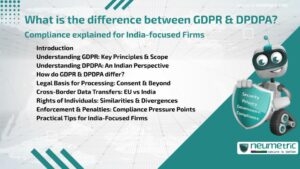Table of Contents
ToggleIntroduction
In today’s digitally connected world, the constant threat of cyberattacks looms large, urging organizations to fortify their defenses. One crucial tool in the cybersecurity arsenal is penetration testing. This practice involves ethical hacking to identify vulnerabilities in a system, but the ethical considerations surrounding it are often understated. As we delve into the intricate realm of “Penetration Testing Ethics: Balancing Security & Privacy,” we aim to shed light on the delicate equilibrium between safeguarding digital assets & respecting individuals’ privacy.
The Basics of Penetration Testing
Before we explore the ethical dimensions, let’s understand the basics of penetration testing. It’s like a digital stress test for your systems, designed to mimic the strategies of malicious actors. The primary goals are to uncover vulnerabilities, assess potential risks, & fortify the security infrastructure. There are different approaches, such as White Box Testing [with full system information], Black Box Testing [with no prior knowledge], & Grey Box Testing [a blend of both].
The Role of Ethical Guidelines
Ethics forms the backbone of any respectable penetration testing endeavor. Imagine a scenario where a security professional bypasses ethical boundaries & compromises privacy in the pursuit of vulnerabilities. It’s a recipe for disaster. Ethical guidelines act as the North Star in this landscape, dictating the rules of engagement. Key principles include obtaining informed consent, adhering to legal compliance, clearly defining the scope of testing, practicing responsible disclosure, & meticulous documentation & reporting.
In essence, ethical guidelines serve as a compass, ensuring that the journey through penetration testing remains true to its purpose—enhancing security without causing harm. The scenario of a security professional overstepping ethical boundaries not only jeopardizes the credibility of the testing process but also undermines the trust that organizations & individuals place in ethical hackers.
By placing a strong emphasis on principles such as obtaining informed consent & adhering to legal compliance, ethical guidelines not only protect the integrity of the testing itself but also safeguard the reputation of the entire cybersecurity community. They create a framework that not only identifies vulnerabilities but does so with the utmost responsibility & respect for privacy.
Balancing Security & Privacy
Walking the tightrope between security & privacy is a challenge that ethical hackers face daily. On one hand, the urgency to fortify digital defenses pushes testers to be thorough & aggressive. On the other hand, there’s a responsibility to handle sensitive data with care. Striking a balance involves anonymizing personal information, minimizing data collection to the essentials, & employing secure methods for handling confidential data. It’s about protecting not just systems but also the individuals behind the data.
Moreover, the challenge of balancing security & privacy extends beyond technical considerations—it’s a delicate dance that impacts real people. Recognizing the human element behind the data emphasizes the need for ethical hackers to be conscientious stewards of information. Anonymizing personal details goes beyond a technical checkbox; it’s a commitment to respecting the dignity & privacy of individuals. By minimizing data collection to only what is necessary, ethical hackers demonstrate a commitment to responsible & ethical practices. This balance not only fortifies digital defenses but also upholds the trust & confidence that individuals place in the guardians of their digital world.
Challenges in Penetration Testing Ethics
The ethical landscape of penetration testing is riddled with challenges. Unintended consequences, the fine line between aggressiveness & caution, & navigating the gray areas of publicly accessible information & third-party involvement are constant hurdles. Ethical lapses can lead to severe repercussions, tarnishing reputations & eroding trust. It’s a call for vigilance, foresight, & a deep understanding of the potential impact of actions taken in the name of security.
Furthermore, the challenges in penetration testing ethics underscore the dynamic nature of the field, where the landscape is constantly shifting. Unintended consequences can arise from even the most well-intentioned actions, emphasizing the need for continual reassessment & learning from each experience. The delicate balance between aggressiveness & caution requires not only technical expertise but also a nuanced understanding of the broader ethical implications. Navigating the gray areas, especially concerning publicly accessible information & third-party involvement, demands a judicious approach that weighs the necessity of information against the potential privacy concerns. In this ever-evolving environment, ethical hackers must not only be adept at finding vulnerabilities but also be resilient, adaptable, & committed to upholding the highest ethical standards to ensure the enduring trust of stakeholders.
Building Trust with Stakeholders
Trust is the currency of the digital realm. Penetration testers must not only be proficient in identifying vulnerabilities but also adept at building trust with stakeholders. Communication strategies, transparency in the testing process, & collaboration with legal & compliance teams are pivotal. Establishing trust ensures that the results of penetration testing are viewed not as threats but as opportunities to fortify the digital fortress.
Evolving Ethical Standards
As technology evolves, so must ethical standards. The fast-paced nature of the digital landscape demands a constant reassessment of ethical guidelines. Keeping pace with technological advancements, industry initiatives, & best practices is imperative. Continuous education & certification ensure that ethical hackers remain at the forefront of ethical conduct, adapting to emerging threats & evolving technologies.
Conclusion
In concluding our exploration of penetration testing ethics, it’s essential to recognize that the intersection of security & privacy is not a static point but a dynamic landscape. The ethical considerations embedded in penetration testing are not mere formalities but the cornerstone of a resilient & trustworthy cybersecurity ecosystem. As we navigate the ever-changing digital terrain, let’s remember that ethical hacking is not just about finding weaknesses; it’s about fortifying the digital world while safeguarding the privacy & trust of its inhabitants.
FAQs:
Why is balancing security & privacy so critical in penetration testing?
Balancing security & privacy in penetration testing is crucial because it’s not just about finding vulnerabilities; it’s about doing so responsibly. By striking the right balance, we ensure that our digital defenses are robust without compromising the personal privacy of individuals. It’s a delicate dance that requires ethical guidelines as our compass.
How do ethical guidelines contribute to the effectiveness of penetration testing?
Ethical guidelines are the backbone of effective penetration testing. They provide a roadmap for ethical hackers, ensuring that the process is transparent, legally compliant, & respectful of privacy. From obtaining informed consent to responsible disclosure, these guidelines not only guide actions but also build trust with stakeholders, making the entire testing process more effective & credible.
In a rapidly evolving technological landscape, how do ethical hackers keep up with changing ethical standards?
Staying ahead in the ethical hacking game requires continuous learning. Ethical hackers adapt to technological advancements through ongoing education & certification. By keeping a finger on the pulse of industry initiatives & best practices, they ensure their ethical standards evolve alongside the ever-changing digital threats, creating a resilient defense against emerging challenges.





